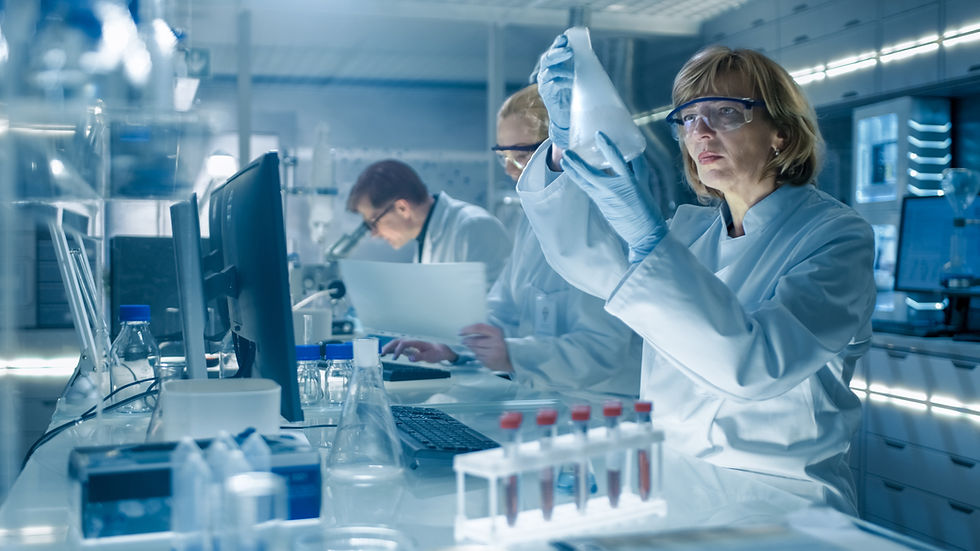Elevating Chemical Quality Control through Generative AI
- Aug 24, 2023
- 3 min read

In the intricate landscape of chemical manufacturing, ensuring consistent product quality is paramount. However, achieving this goal requires not only meticulous planning but also real-time adaptability. This is where Generative Artificial Intelligence (AI) emerges as a transformative force, reshaping the foundation of quality control. By harnessing the power of AI algorithms and molecular insights, chemical processes are monitored, controlled, and optimized in ways that were once considered unattainable. This article delves into the profound impact of Generative AI on chemical quality control, unraveling the intricacies of real-time monitoring, predictive defect modeling, and the vital role that technology companies play in advancing these practices.
Real-Time Monitoring: A Proactive Approach to Excellence
The essence of quality control lies in the ability to identify deviations and intervene promptly. Generative AI revolutionizes this aspect through real-time monitoring, where data streams from sensors and reactors are analyzed in the blink of an eye. AI algorithms meticulously scrutinize these streams, swiftly detecting any deviations from expected outcomes. This enables operators to receive real-time alerts and actionable insights, allowing them to address issues promptly and ensure that the manufacturing process remains on the path of excellence.
Predictive Modeling: Anticipating and Preventing Defects
Reducing defects is the hallmark of a finely tuned manufacturing process. Generative AI contributes to this goal by tapping into the power of predictive modeling. By leveraging historical data and learning from past incidents, AI algorithms become adept at forecasting potential defects or quality deviations. This predictive prowess is the result of AI's ability to identify patterns and correlations that might be imperceptible to human operators. Armed with this knowledge, operators can proactively adjust process parameters and fine-tune the manufacturing conditions to circumvent defects before they arise.
Enhancing Consistency: A Symphony of Precision
Consistency is the cornerstone of quality. Generative AI introduces an unparalleled level of precision to this aspect by optimizing process parameters for uniform product characteristics. Whether it involves tweaking reaction conditions, fine-tuning raw material proportions, or adjusting other critical variables, AI ensures that each batch adheres to stringent quality standards. This harmonious orchestration of factors results in products that not only meet the desired specifications but also exhibit consistent excellence, bolstering consumer trust and satisfaction.
Technology Company's Role: Champions of Transformation
In the journey toward advanced quality control, technology companies emerge as champions of transformation. Collaborating closely with industries, they develop AI-powered platforms that seamlessly integrate with existing manufacturing systems. This partnership ensures that AI-driven quality control becomes an organic part of the manufacturing process. By providing tools and platforms that facilitate the adoption of AI-driven practices, technology companies pave the way for enhanced reliability, efficiency, and excellence in chemical manufacturing.
Data-Driven Decision Making: A Precise Path Forward
Generative AI injects data-driven decision-making into the heart of quality control. Analyzing vast and intricate datasets encompassing process parameters, sensor readings, and product quality metrics, AI generates insights that empower operators to make informed decisions. This data-driven approach significantly reduces the reliance on intuition and guesswork, enabling operators to make choices that are grounded in quantitative analysis and maximized precision.
Ethical Considerations: The Balance Between Innovation and Responsibility
As Generative AI transforms quality control, ethical considerations become paramount. Ensuring that AI-driven decisions adhere to safety standards, addressing concerns of unintended consequences, and striking a delicate balance between innovation and quality assurance are pivotal. By navigating these ethical considerations thoughtfully, the industry can embrace AI's potential while upholding the principles of safety and responsibility.
Conclusion: Precision and Excellence Redefined
Generative AI's integration into chemical quality control signifies an epoch of precision and excellence. The marriage of real-time monitoring, predictive defect modeling, and advanced technology empowers the manufacturing process to reach new heights of reliability and efficiency. In this futuristic landscape, chemical manufacturing doesn't just aim for consistency—it delivers excellence, meeting and exceeding the demands of a rapidly evolving industry.




Comments